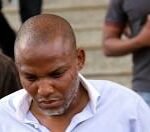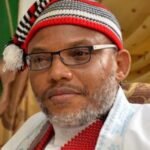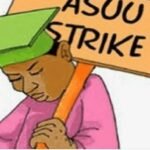The Abuja Division of the Court of Appeal has fixed October 16 to hear the appeal filed by the Indigenous People of Biafra (IPOB) challenging its proscription as a terrorist organization, by the Federal Government, Vanguard reported.
The court will also hear an application the detained leader of the IPOB, Mazi Nnamdi Kanu, filed to be joined as an interested party in the case.
Specifically, IPOB, through its lawyer, Mr Ifeanyi Ejiofor, is praying the appellate court to set aside in its entirety, the ruling/final decision of the late former Chief Judge of the Federal High Court, Justice Abdul Abdu-Kafarati, which on September 15, 2017, outlawed its activities in Nigeria.
Justice Kafafati, further restrained “any person or group of persons from participating in any of the group’s activities.”
The court on January 22, 2018, dismissed a motion IPOB filed to challenge the legal validity of the proscription order which it said was surreptitiously obtained by the AGF.
IPOB had alleged that the AGF suppressed and misrepresented facts in the affidavit evidence he tendered before the court.
Meantime, in its five grounds of appeal, IPOB contended that Justice Abdu-Kafarati erred in law and occasioned a miscarriage of justice, saying the lower court Judge failed to evaluate, consider or mention in his ruling, affidavit evidence that was tendered to establish that IPOB was not a violent organisation.
“Proper findings of facts built on a meticulous evaluation of Affidavit evidence placed before the Court below, will resolve whether the activities and characters of the Appellant as clearly distinguished vide compelling exhibits placed before the Court, meet the threshold definition of terrorism acts, as contemplated under Section 2 (i) (a) (b) & (c) of the Terrorism Prevention (Amendment) Act, 2013.
“The Appellant’s activities as contested in its written submission before the Trial Court, strongly supported by credible Affidavit evidence falls short of acts of terrorism as contemplated under Section 2 (1) (A) (B) & (C) of the Terrorism (Prevention) (Amendment) Act; this submission was not considered by the Learned Trial Judge.
“The Learned Trial Judge justified the granting of the Exparte Order of 20th September 2017, vide finding of facts predicated on issues he formulated suo motu, ostensibly closing his eyes to facts, as well as documents that show that the Appellant is a group of persons holding common political belief largely made up of indigenous people of Igbo extraction and other neighbouring regions merely exercising their constitutional rights to self-determination, within the bounds of relevant international instruments and conventions.
“Affidavit evidence placed before the Trial Court shows in clear terms that the Appellant does not possess any form of arms, or weapons in the exercise of their constitutionally guaranteed rights, or have any history of violence or had engaged in any form of killings; the activities of the Appellant are essentially characterized by moving in groups with cardboards and placards in their hands, singing, blowing whistles and flutes, in agitation for self-determination; these compelling facts clearly supported by credible evidence were not evaluated by the Court below in its finding of facts.
“Activities of the Appellant as demonstrated before the lower court, is in sharp contrast with characters of notorious groups that have even used violence such as FULANI HERDSMEN (which has been declared the 4th most dangerous terrorist organization in the world), and none of these violent group has earned terrorist tag, because the President most probably considered them as possessing or professing protected political beliefs”, IPOB added.
Ifunanya Ikueze is an Engineer, Safety Professional, Writer, Investor, Entrepreneur and Educator.























































